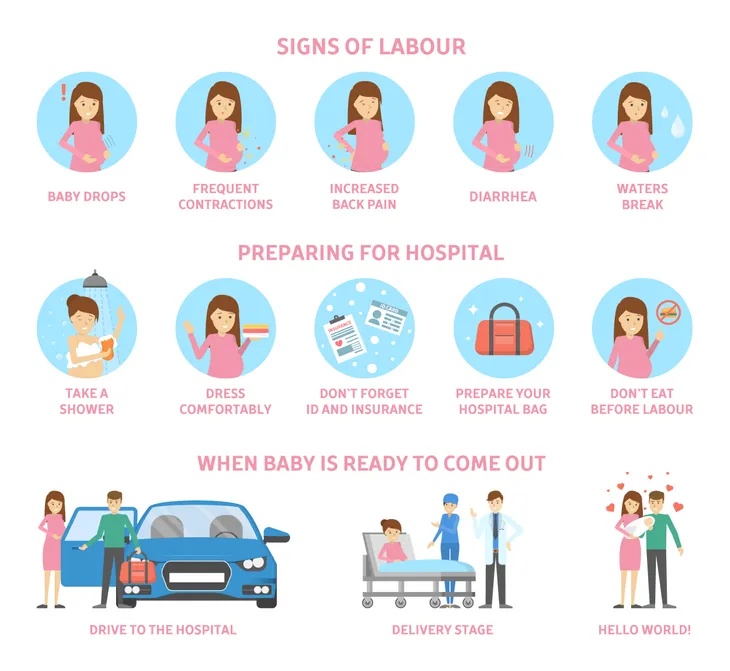When it comes to delivering a healthy, happy baby, there are no silly questions. Obviously, a main concern for most expecting moms and dads surround how to know when labor is actually happening in order to get to the hospital on time. However, there are many other commonly asked questions surrounding childbirth that may surprise you, but make total sense to an overwhelmed mom-to-be.
So without further adieu, here are the 10 most frequently asked questions about labor…
How Do I Know When It’s Time To Go To The Hospital?
This is the most common question for first-time parents (dads are always a little jumpy about the timing). Having been in contact with your doctor or midwife, they will coach you through the process and help alleviate your fears concerning hospital timing. If you don’t have an existing medical issue, hospital staff will typically send you home if you arrive too early.
Most new moms will be advised that it’s time to go to the hospital when contractions are 3-4 minutes apart, one-minute long, for at least one hour in duration.
How Can I Tell If My Water Breaks?
Do you remember that movie where the woman’s water breaks and she rushes to the hospital and has the baby right away? Well, in reality it doesn’t happen that way. Water breakage prior to labor is the spontaneous rupture of membranes that unlike peeing, you continue to leak clear fluid (either as a gush or more slowly) and doesn’t smell like urine.
When your water breaks it’s the beginning of a process that can take 24-hours or more to complete before you see your little bundle of joy for the first time.
What Are The Other Signs That My Labor Has Begun?
Following your water breaking and Braxton Hicks contractions (also called warm-up contractions), the primary signs that you are in labor include the following signs—loss of the mucous plug, the baby “dropping” into birth position, a nauseating feeling, and contractions (or tightening of the uterine muscles) that become closer together (5 to 6 minutes apart), longer in duration (about 45 seconds), and literally demand all of your focus and energy.
When Should I Get an Epidural?
Every hospital will differ slightly when it comes to offering birth anesthesia. However, epidurals are typically available as long as a woman in labor can sit still to have one inserted by an anesthesiologist. If you are set on an epidural, be sure to talk to your doctor or midwife ahead of time so your wishes are known.
Will I Have a Bowel Movement If I Push Too Hard?
You might be embarrassed thinking about this now, but during delivery it will be the last thing on your mind. Doctors, nurses, and midwives have been there and cleaned up worse. And with all of that hard pushing, especially near the end of your labor, there’s a good chance your bowels may loosen.
What Should I Bring With Me To The Hospital?
Moms in delivery and post-delivery should be as comfortable as possible. That’s why the following is recommended for your hospital bag—your insurance information, a loose nightgown, a bathrobe, slippers, a few pairs of clean socks, eyeglasses (if needed), hair ties to hold long hair back during labor and breastfeeding, books or magazines, an iPod, a comfortable pillow, a nursing bra and breast pads, extra underwear, personal toiletries, toothbrush and toothpaste, cell phone (with your contacts) and a charger, a camera, and a comfortable outfit to return home in.
What’s a Doula And Do I Need One?
Doulas provide continuous labor support. They can aid in pain coping during labor, company during a lengthy hospital stay, and they provide extra ears and eyes for navigating the hospital. Doulas are credited with reducing the stress and length of labor, and often intervene in the cases of unnecessary C-sections.
Is There Anything I Can Do To Prevent Tearing?
Most women superficially tear during a first-time vaginal delivery. However, tearing through muscle during birth will be determined by your genetics, your size, weight and position of your baby, the size of your baby’s head, and if your physician performs an episiotomy (an incision to the vaginal opening that can actually cause more tearing).
Delivering in an upright position is often credited with reducing pressure on the perineum, and lessening the risk of serious tearing because of gravity. Before your delivery, you can do your part to reduce tearing by eating well and doing Kegel exercises, and staying active.
How Long Will I Be In The Hospital?
Your hospital stay will depend upon your recovering from delivery—for instance, if you experienced serious tears, cesarean birth, heavy bleeding, unstable vital signs post-delivery, or if you are unable to care for yourself and your baby at home, your hospital stay may be extended past a few days time. The typical stay is 24 to 48-hours for a vaginal delivery and 48 to 72-hours for a c-section.
Your baby should also be urinating and having regular bowel movements, and be able to nurse or formula feed with success before leaving the hospital.
What is The Recovery Time for a Vaginal Birth vs. a Cesarean Section?
Your body has been through quite the ordeal to give birth to your baby, and you will need adequate time to recover. With a normal, vaginal birth you will bleed for a few weeks following birth as well as feel pain in the genital area (especially if you tore during delivery). You may also experience hemorrhoids (due to pushing), and lower back pain for about 3 months following delivery.
A cesarean section, on the other hand, will have additional itching and scarring to deal with for at least 4-weeks. Incision pain can last up to 8 weeks, but diminishes greatly after 1 to 2 weeks. You will also have to refrain from sex and halt any exercise for at least 6 weeks.













